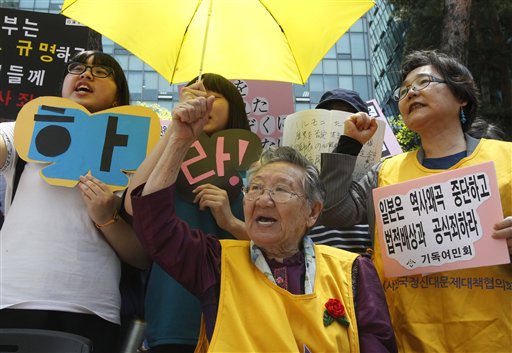Japan won't change apology on forced prostitution
Tuesday, March 11, 2014
 In this Wednesday, May 15, 2013, file photo, former South Korean comfort woman Kil Un-ock, center, who was forced to serve for the Japanese troops as a sexual slave during World War II, shouts slogans during a rally against the recent comment of Osaka Mayor Toru Hashimoto in front of Japanese Embassy in Seoul, South Korea.
In this Wednesday, May 15, 2013, file photo, former South Korean comfort woman Kil Un-ock, center, who was forced to serve for the Japanese troops as a sexual slave during World War II, shouts slogans during a rally against the recent comment of Osaka Mayor Toru Hashimoto in front of Japanese Embassy in Seoul, South Korea.TOKYO - Japan said Monday it is not planning to change its 1993 apology over a system of forced prostitution for its military during World War II, but will continue to re-examine a study on which it was based.
Japan has come under fire from Asian neighbors for setting up a group to verify the accuracy of interviews more than 20 years ago with women who said they worked as sex slaves for Japanese soldiers before and during the war.
Historians say tens of thousands of women served as sex slaves, called "comfort women" in Japan. Some Japanese nationalists have long insisted that women in wartime brothels were voluntary prostitutes, not sex slaves.
Chief Cabinet Secretary Yoshihide Suga told reporters Monday that the government has no plan to change its official apology, called the Kono statement after Yohei Kono, the government spokesman at the time who issued the apology.
"We are not thinking about changing the Kono statement," Suga said.
But he said the government will continue the review of the evidence that backed the statement.
He did not address what it might do if anything turned up that questioned the statement.
A perceived move to a more assertive Japan by Prime Minister Shinzo Abe, who took office last year, has stirred up tensions with China and South Korea.
Abe set off outrage by visiting Yasukuni Shrine, which honors the war dead, including Japanese war criminals, although he has said he went there in a spirit of peace.
The United States has appealed to Japan and South Korea to improve their strained relations and show restraint over their "difficult historical issues."
State Department spokeswoman Jen Psaki on Monday welcomed the Abe government saying it would uphold the Kono statement.
"We encourage Japan's leadership to approach this and other issues arising from the past in a manner that is conducive to building stronger relations with its neighbors, so we felt that was a positive step," she told reporters in Washington.
